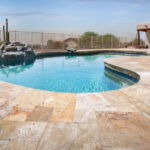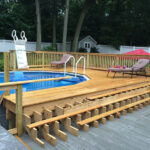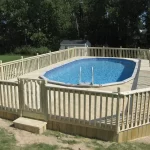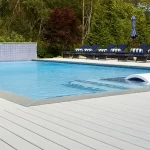Pool decks are an essential feature of any backyard pool area. Not only do they provide a safe and comfortable surface for swimmers to walk on, but they also enhance the overall aesthetic appeal of the pool area. There are many different materials that can be used to construct pool decks, each with its own set of advantages and disadvantages.
One popular option for pool decks is concrete. Concrete is a durable and low-maintenance material that can be easily customized with various finishes and colors. It is also relatively affordable compared to other materials, making it a cost-effective choice for many homeowners. However, concrete can become hot to the touch in direct sunlight, which may not be ideal for barefoot swimmers.
Another common material used for pool decks is wood. Wood decks have a natural, rustic look that can complement a variety of pool styles. They are also relatively easy to install and provide a comfortable surface for swimmers to walk on. However, wood decks require regular maintenance to prevent rotting, warping, and splintering, which can be time-consuming and expensive.
For a more luxurious and elegant pool deck option, many homeowners choose to use natural stone such as travertine or limestone. Natural stone decks are highly durable and resistant to heat, making them a comfortable choice for barefoot swimmers. They also offer a timeless and sophisticated look that can enhance the overall beauty of the pool area. However, natural stone decks can be expensive to install and may require regular sealing to prevent staining and weathering.
Alternatively, composite decking is a popular choice for pool decks due to its durability and low maintenance requirements. Composite decking is made from a combination of wood fibers and recycled plastics, making it resistant to rot, mold, and fading. It is also splinter-free and slip-resistant, making it a safe choice for pool areas. However, composite decking can be more expensive than traditional wood decks, although it may ultimately save homeowners money on maintenance and replacement costs in the long run.
Ultimately, the best material for a pool deck will depend on the homeowner’s budget, desired aesthetic, and maintenance preferences. Regardless of the material chosen, a pool deck should be properly installed and maintained to ensure its longevity and safety for swimmers. With the right choice of materials and proper care, a pool deck can enhance the enjoyment and beauty of any backyard pool area.
















